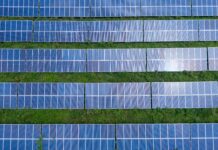Doug Young
China and the European Union have reached a new settlement that should formally end their ongoing dispute over solar panels, contrasting sharply from a more confrontational tack taken by the US in a similar spat. Meantime in other solar news, a looming new bond default by a mid-sized panel maker has become the latest sign that Beijing is prepared to let more of these smaller companies miss their debt payments. That approach will force these smaller firms to either leave the industry or sell their money-losing operations to larger peers, in a much-needed industry consolidation.
Let’s start with the latest China-EU settlement, which involves polysilicon, the main ingredient used to make solar panels. Beijing opened an anti-dumping investigation into EU polysilicon in late 2012, a move that many saw as retaliatory for an earlier EU probe that found Chinese solar panel makers were selling their products in Europe at unfairly low prices. The original dispute centered on complaints by both the US and Europe that Chinese solar panel makers were undercutting their western rivals after receiving unfair government support in the form of subsidies like low-cost land and cheap loans.
China and Europe settled their initial dispute over solar panels last year, in a landmark deal that saw Chinese manufacturers agree to raise their panel prices to a minimum level agreed to by both sides. (previous post) Now this latest agreement will see European polysilicon makers also agree to sell their products into China at a minimum price agreed to by both sides. (English article) The main beneficiary of this new deal is Germany’s Wacker Chemie, which is Europe’s main polysilicon seller to China.
The EU’s 2 settlements contrast sharply with the approach taken by the US, which conducted its own investigation and last year imposed anti-dumping tariffs on Chinese solar panels. As a result, China opened its own probe into US polysilicon, which ended this year with retaliatory anti-dumping tariffs against US-made polysilicon.
On the one hand, I should applaud the EU for its more reasonable and pragmatic approach to this matter, even though the setting of minimum prices has nearly the same effect as imposing punitive tariffs. But that said, I do also think the US approach sends a stronger message to Beijing that it needs to stop its practice of giving money to industries it wants to promote. Perhaps this mixed approach by the US and Europe is the best way to send the message to Beijing, providing both positive and negative incentives to change its behavior.
From that solar dispute, let’s look quickly at the latest looming bond default from smaller panel maker Baoding Tianwei (Shanghai: 600550). The company has announced that trading of 1.6 billion yuan ($260 million) worth of its bonds has been halted on the Shanghai Stock Exchange. (English article; company announcement) Tianwei has lost big money for the last 2 years, so it’s not a huge surprise that it might not be able to repay its debt. The bigger surprise is that it might be allowed to default on the bonds, since Beijing or local governments often come to the rescue of companies that risk debt defaults.
We saw something similar happen earlier this month when Chaori Solar (Shenzhen: 002506), another smaller player, failed to make an interest payment for some of its bonds, becoming the first corporate bond default in modern Chinese history. (previous post) This latest case involving Tianwei shows that Beijing is preparing to allow more such defaults on solar debt. That should ultimately force many of these smaller players to either shut down or sell their operations to larger players like Canadian Solar (Nasdaq: CSIQ) and Trina (NYSE: TSL), which are emerging as industry consolidators.
Bottom line: Europe’s latest solar settlement with Beijing will end their trade dispute in an amicable way, while a new looming bond default by Tianwei reflects China’s ongoing resolve to consolidate the sector.
Doug Young has lived and worked in China for 15 years, much of that as a journalist for Reuters writing about Chinese companies. He currently lives in Shanghai where he teaches financial journalism at Fudan University. He writes daily on his blog, Young´s China Business Blog, commenting on the latest developments at Chinese companies listed in the US, China and Hong Kong. He is also author of a new book about the media in China, The Party Line: How The Media Dictates Public Opinion in Modern China.






